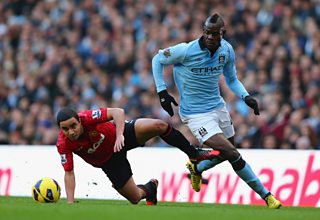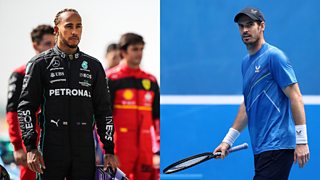Seven things we learned from The Question of Sport Podcast
Every episode of The Question of Sport Podcast is filled with the most incredible facts and stories from the history of sport. With the show returning to 主播大秀 Sounds, we take a look back at some of the most astounding things the show has taught us so far.
1. Only one Italian footballer has won the Premier League
Despite the likes of Gianfranco Zola, Gianluca Vialli and Marco Materazzi having graced the Premier League, wayward Italian forward Mario Balotelli remains the only footballer from his nation to have won the competition, or indeed the old First Division.

Balotelli was part of the Manchester City team that was victorious in the race for the title in 2012, starting a dominant period for the club. Amazingly, Balotelli’s only assist for the club was for the goal that Sergio Aguero scored in the 94th minute of very last game of the season which won City their first league title since 1968.
Manchester United’s backup goalkeeper, Italian Massimo Taibi, did play four times early in their victorious campaign in 1999-2000, but this did not qualify him for a winner’s medal and he had left the club by the time the title was won. Find out more
2. The longest point in a tennis match lasted 29 minutes
At the Virginia Slims tournament in Richmond, Virginia on 24 September 1984, world number 93 Vicki Nelson-Dunbar and world number 172 Jean Hepner played out a point that lasted an incredible 29 minutes and 643 shots. It remains the longest single point in a professional tennis match.
The point occurred with Hepner 11-10 up in the second set tie break, with Nelson-Dunbar having won the first set 6-4. After winning the point, Nelson-Dunbar collapsed with cramp in her legs and the chair umpire called a time violation warning on her. Fortunately she was able to get back to the baseline to start the next point. Two points later, Nelson-Dunbar closed out the match.
That second set tie break lasted an unbelievable 1 hour 47 minutes and the match lasted 6 hours 31 minutes, which was then longest match in history. However, that record is now held by John Isner and Nicolas Mahut who played out an epic 11 hour 5 minute match during the opening round of Wimbledon in 2010. Find out more
3. Olympic medals were won for works of art
For 36 years between 1912 to 1948, there were competitions at the Olympics for the discipline of art. Medals were awarded in five categories – architecture, literature, music, painting and sculpture – and work had to be inspired by sport.
The proposal for the competitions came from the French Baron, Pierre de Coubertin, known as the father of the modern Olympics after he founded the International Olympic Committee in 1894 and birthed the modern games. De Coubertan actually won a gold for a poem he entered under a pseudonym in 1912.
When the categories were eliminated from the Games after 1948 the past medals were expunged and so they are no longer part of official Olympic records. Find out more
4. NFL team the Philadelphia Eagles are mentioned in the Star Wars films
David Acord is a successful sound engineer and also a huge fan of American Football team the Philadelphia Eagles. In fact, he is so obsessed with the Eagles that when he found himself working on the recent Star Wars films he couldn’t resist sneaking some references to his beloved team into the Star Wars universe.

Acord's two favourite players are Brent Celek and Fletcher Cox, so when he voiced a character called Teedo in 2015’s The Force Awakens, he made "Celek" and "Fletcher" words in Teedo’s language. Then, when he worked on Rogue One the following year, he translated the Eagle’s anthem "Fly Eagles Fly" into Esperanto and had it chanted in the background for scenes in Jedha City. Find out more
5. An Australian rugby union international was also an undercover policeman
In the era before rugby union became professional in 1995, even the top players had to have a career outside the game. Australian prop Dan Crowley was no different, and having started his police career in the early 1980s he moved up to a role as a plain clothes detective and from there started undertaking undercover work trying to bring down drugs rings on the Gold Coast. It was then that he started to get picked to represent Australia. To keep both his job and his rugby going, he met with members of the press to request they limited references to him and photos.
Eventually he had to give up the undercover work as his profile rose and he wrote an autobiography about his experience, the suitable titled Undercover Prop. Find out more
6. 23 March is the best day to be born if you want to win an Olympic gold
A total of 33 Olympic medals have been won by Team GB athletes born on 23 March, 21 of the golds. Among them are some of the greatest Olympians from the UK.
They include runner Mo Farah, winner of the 5,000m and the 10,000m at both the London Olympics in 2012 and Rio in 2016, rower Steve Redgrave, the only Briton to win gold at five consecutive Olympics, Sir Chris Hoy, who has six golds and a silver, and his fellow cyclist Jason Kenny, whose seven gold medals make him Team GB’s most successful Olympian ever. Added to them, Roger Bannister, the first man to run a mile in under four minutes, and Joe Calzaghe, statistically Britain’s most successful boxer, also have 23 March birthdays.
Interestingly, exactly nine months before 23 March is 23 June: International Olympic Day. Find out more
7. Eight of the world's 10 biggest stadiums are for American college football
The world’s biggest stadium is the Narendra Modi Stadium, a cricket ground in Ahmedabad, India which can seat up to 132,000 people. The second biggest is the Rungrado 1st of May Stadium in Pyongyang, North Korea which holds 114,000 (although North Korean authorities originally claimed it held 150,000).
All the other stadiums in the top 10 are used for American Football, but they all homes of college football teams, not those of the NFL. These eight venues, all of which seat over 100,000 spectators, can be found in Michigan, Pennsyvania, Ohio, Louisiana, Tennessee and Alabama with two in Texas. They demonstrate the extraordinary popularity of college football in the USA. Find out more
Subscribe to The Question of Sport Podcast on 主播大秀 Sounds to get all the stories from the new series. And if you want to share your own incredible sporting story on the podcast, email qospod@bbc.co.uk
Catch up with more stories from The Question of Sport Podcast
-
![]()
Listen to The Question of Sport Podcast
Subscribe now so you never miss an episode
-
![]()
The Clinton Morrison World Tour
Go on a journey with the retired footballer
-
![]()
Infamous mistaken identities
Some of the silliest cases of mistaken identity in sport
-
![]()
QUIZ: Is the sports star older or younger?
Is Lewis Hamilton older or younger than Andy Murray?




